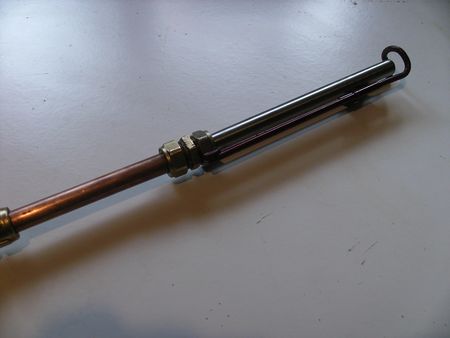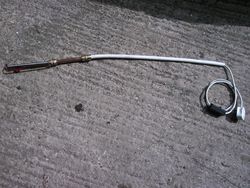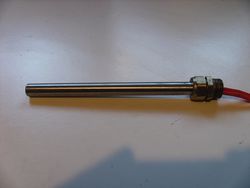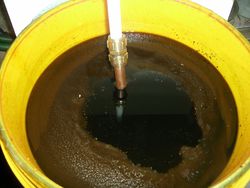Difference between revisions of "Melting stick"
(→How to assemble) |
|||
| Line 57: | Line 57: | ||
===How to assemble=== | ===How to assemble=== | ||
| − | Firstly solder the piece of steel to one of the flat surfaces of a compression nut,this | + | Firstly solder the piece of steel to one of the flat surfaces of a compression nut,this is a stand off to keep the heater away from the container walls and the curl at the end keeps it off the container bottom,tighten the heater into a straight 15 mm compression fitting using the nut with the stand off, then attach the copper 15 mm copper pipe to the other end of the fitting,this needs to be short enough that the heater wires protrude. |
| − | Attach the other | + | Attach the other straight 15 mm compression fitting to the other end of the copper pipe. |
| − | Put an insert into one end of the plastic pipe and feed the cable down the pipe,connect and insulate the heater to the cable then join the plastic pipe to the | + | Put an insert into one end of the 15 mm plastic pipe and feed the cable down inside the pipe,connect and insulate the heater to the cable then join the plastic pipe to the compression fitting. |
| + | An inline switch on the cable makes it easier to use | ||
| + | |||
| + | Although known by some low lifes as a tosser tube it is really a modern red hot poker and can be demonstrated on said low life! | ||
[[File:Melting_stick_006.jpg|250px|thumb|left|Melting its way into a tub]] | [[File:Melting_stick_006.jpg|250px|thumb|left|Melting its way into a tub]] | ||
| − | |||
==See also== | ==See also== | ||
Revision as of 20:30, 21 October 2012
The melting stick is constructed using a 220-240 volt cartridge heater. These are readily available from on-line auction sites and other outlets. The heaters are available in 110v and 230v versions and are offered in a range of Wattages from 150W to 600W.
The unit described here is based on a 300W unit, a size which has proved satisfactory for melting volumes of 20 litres and greater. The design of the "tosser tube" is sufficiently compact to fit through screw top lids of plastic cubies and 20 litre tins.
Contents
Components
- 1 off ... cartridge heater 15mm outside diamater, 300W (available in various wattages)
- 2 off ... 15mm - 15mm straight compression fittings
- 1 off ... short length of 15mm copper pipe
- 2ft ... 15mm plastic pipe
- 1 off ... plastic pipe insert
- 1 off ... cable and plug
- 2 off ... connectors and insulating tape
- 1 off ... piece of metal slightly longer than the heater with the end bent over
How to assemble
Firstly solder the piece of steel to one of the flat surfaces of a compression nut,this is a stand off to keep the heater away from the container walls and the curl at the end keeps it off the container bottom,tighten the heater into a straight 15 mm compression fitting using the nut with the stand off, then attach the copper 15 mm copper pipe to the other end of the fitting,this needs to be short enough that the heater wires protrude. Attach the other straight 15 mm compression fitting to the other end of the copper pipe. Put an insert into one end of the 15 mm plastic pipe and feed the cable down inside the pipe,connect and insulate the heater to the cable then join the plastic pipe to the compression fitting. An inline switch on the cable makes it easier to use
Although known by some low lifes as a tosser tube it is really a modern red hot poker and can be demonstrated on said low life!
See also
Use if there are similar pages in the wiki, if not delete.
- Link within this wiki here
- Link within this wiki here
- Link within this wiki here
~~KH~~
... delete this "nowiki" tag once you have set your categories (it's just there to stop this section getting indexed on the main page!)
For Biodiesel ...
[[Category:Biodiesel]]
[[Category:Ingredients and preparation]]
[[Category:vegetable oil]]
[[Category:Filtration & drying equipment]]
Please Note: To get your page indexed on the main page it is necessary, to got to the main page, click the edit tab and then click save.
... delete this "/nowiki" tag once you have set your categories (it's just there to stop this section getting indexed on the main page!)




